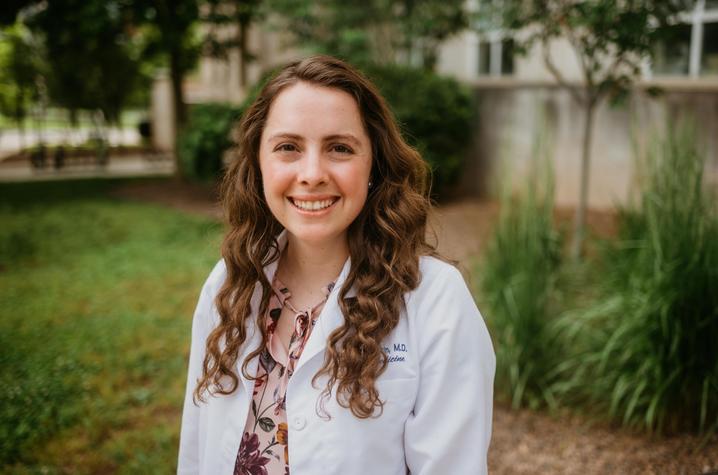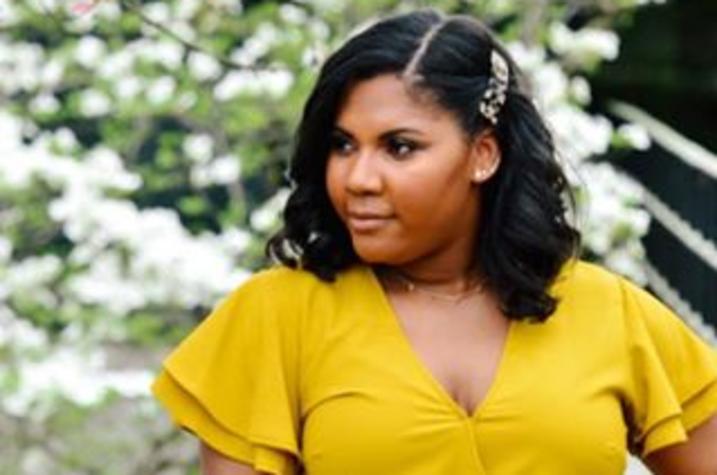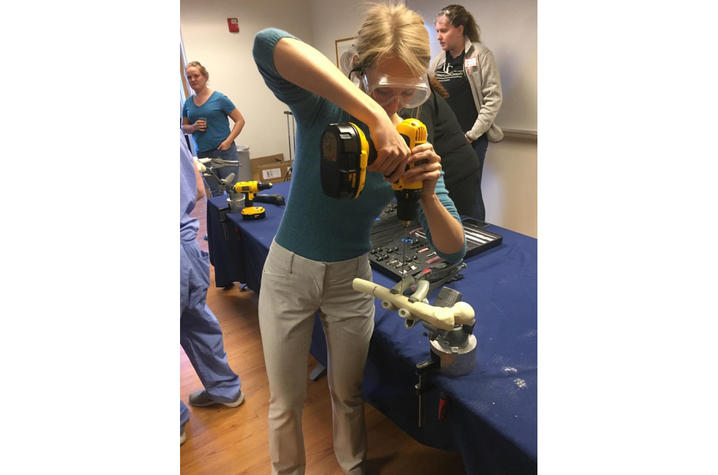Dancing Wildcats Enjoy Smoother Transition to the Field of Medicine
LEXINGTON, Ky. (Aug. 6, 2020) — The connection between art and medicine has been a focus of medical education institutions for decades.
In 1983, Yale School of Medicine created the Program for Humanities in Medicine to create better doctors and better patient relationships. Viewing a patient as a complete human being with stories outside of their symptoms or ailments can lead to more empathy between doctors and patients. Dozens of medical schools have been exposing residents to art to build their observation skills. In 2016, Harvard Medical School began integrating drama, dance and literature into their curriculum to increase student empathy and reflection.
Art translates across all disciplines in a way that can inform the lens through which we view the world. The University of Kentucky College of Fine Arts currently offers two degrees that specifically address arts in health care, the Master of Music in Music Therapy program, Kentucky’s first and only graduate program of its kind, and the Bachelor of Science in Digital Media Design program for Pre-Med, suited for students interested in the latest advances in bio-technologies related to data visualization and simulated environments. But future doctors are not only selecting these dedicated hybrid programs to expand their skills while pursuing their undergraduate studies at UK.
“Our dance program also allows students to study both arts and health care," UK Dance Program Director Susie Thiel said.
“During their time here, these alums used dance choreography combined with a scientific study to create dances and present their research,” Thiel added. “Topics ranged from the various shades of schizophrenia to how cortisol is produced in the body when it perceives stress to the emotional and scientific findings of dementia. These dances were performed at the National Conference of Undergraduate Research, the American College of Dance Conference and at UK in 'Materialized' (student choreography concert) and the Showcase of Undergraduate Research.”
Students frequently choose to study in the UK Deparment of Theatre and Dance because they can focus on two very diverse disciplines as undergraduates. “Our dance students double major or minor in other disciples including communications, biology, chemistry, education, pre-med, journalism, accounting, computer science and nursing, to name a few,” Thiel noted.
UK Fine Arts recently caught up with five former and current UK dance students who have stretched their artistic talents across disciplines into the field of medicine to learn more about their experiences.
Katelyn Cox (2020 agricultural and medical biotechnology bachelor's degree, minor in dance)
“I absolutely think dance is what initially made me so interested in the human body and the amazing things it can do,” Cox said. “When I started college, I became fascinated with finding how dance overlaps with science and medicine. The program, specifically, allowed me to grow as a dancer in technique and appreciation, and helped me explore my ideas about the interdisciplinary overlap through choreography. Being a dancer made me stand out when I applied for medical school (and I think it helped me get in!), but has also kept me grounded by giving me a humanistic outlook, which I will carry with me as a future physician.”
Cox's fascination with science and medicine inspired her interdisciplinary project "Finding the Common Essence: Using Dance as a Medium to Explore Analogies Between the Life Sciences and Our Everyday Lives," which placed second in the 2019 Oswald Research and Creativity Competition's Fine Arts category.
View Cox's dance piece online here.
Dr. Liza Belle Bastin (2019 graduate of UK College of Medicine, 2015 minor in dance)
“The UK Dance Program was a vital part of my education,” Bastin said. “The program challenged me to think creatively, build confidence, act boldly and respect both my mind and body. Each invaluable faculty member invested into me, daring me to grow on a daily basis as an artist, a mover, a critical thinker and as a human. During my undergraduate studies I participated in dance research by exploring the intersection of science and art, specifically through movement and the study of the human body. This provided me with many academic opportunities, such as presenting twice at the National Conference on Undergraduate Research. I carried these unique experiences with me throughout my medical training, often catching attention of many within the field of medicine.”
During her residency interviews, Bastin was often asked questions about her experience as a dancer, sparking thoughtful conversations about the interdisciplinary connection between dance and medicine.
“The dance program was the perfect complement to my science and medical studies, allowing me to pursue all of my passions and be well balanced as a whole.”
Kirstin Sylvester (2016 bachelor's degree in psychology, minor in dance); recently completed master's degree in educational psychology at Georgia State University
"The University of Kentucky’s Dance Program was a highlight of my undergraduate experience,” Sylvester said. “It not only served as a creative outlet but served as a medium through which I grew personally and professionally.
"As a psychology and pre-med undergraduate, I was interested in the complexities inherent in psychological diagnosis and how that can be portrayed through dance. Director Susie Thiel supported the exploration of cross discipline work and encouraged me to submit a self-choreographed piece at the National Conference of Undergraduate Research. The work was selected and furthered my interest in psychotherapy. This is only one of the many opportunities the dance program provided me that aided in my professional development. Personally, the dance program provided an inclusive and supportive environment in making life decisions through prompts, improvisation and reflection. Since, I have completed my master’s in clinical mental health counseling and will be pursuing my Ph.D. in counseling psychology in August. It is my hope to be a resource for hope, support and change to others as the dance program was for me.”
Alyssa Noell Conley (2016 bachelor's degree in biology, minors in Spanish and dance)
Conley is currently studying at the University of Pikeville’s Kentucky College of Osteopathic Medicine and attributes a lot of her success to her experience minoring in dance at UK.
“Dance has always played a large role in my life, and I believe it is where I learned the dedication and perseverance necessary to pursue medicine,” Conley said. “It has also been the spark of my interest in the human body’s inner workings. During my time in the dance program I learned so much about creative problem solving that has benefited me in my medical education. My dance minor also promoted my engagement in meaningful research that I have presented. This research has been one of the most discussed experiences on my CV in my admission interviews as well as my residency interviews — I think dance has shown me to be well-rounded and innovative in learning, which to me has been essential to completing medical school.”
Olivia Grothaus (2020 UK College of Medicine, 2017 bachelor's degree in biology, minor in dance)
Grothaus says her experience in the UK Dance Program has helped her in ways she never imagined.
“I originally sought out the program to bring some diversity to my education, to learn new skills and honestly to do something fun that would challenge me,” she said. “Going through the dance program was challenging, but that also helped prepare me for medical school. I gained a greater focus as I encountered new techniques or styles I wasn’t familiar with.”
Grothaus believes that studying art can help create better medical professionals. “I also learned to listen in a different way than most and homed in on observation skills that I think ultimately allow me to take better care of patients. The creativity that dance fostered absolutely nurtured my critical thinking skills that are invaluable learning medicine, and the emotional connection within dance I believe makes me a better doctor to my patients.”
While the pressure in the dance studio versus medical school can be different, Grothaus attributes her dance training to her physical resiliency during rigorous medical training.
"I already had so much practice with having to physically continue to push through challenges and try again and again, my resiliency in medical school was definitely better for it. The correction and scrutiny by my dance instructors taught me to pay attention to detail, understand what my body needed to do and make fine adjustments quickly. I learned how to be coachable, and as a future surgeon who has a lot to learn in the operating room, those skills will hopefully come through. Learning dance gave me an appreciation for what the human body can do and convey that has persisted into my passion for medicine. Dancers and medical students I found to be much alike in their type A personality, constant chasing of perfection but overall their passion and dedication to what they do."
The Department of Theatre and Dance, part of UK College of Fine Arts, provides students hands-on training and one-on-one mentorship from professional theatre and dance faculty and renowned guest artists in acting, directing, playwriting, theatrical design and technology, and dance. From mainstage productions to student-produced shows, students have plenty of opportunities to participate on stage or backstage. Special programs include a musical theatre certificate, education abroad, as well as a thriving dance program that emphasizes technique, composition, performance and production.
As the state’s flagship, land-grant institution, the University of Kentucky exists to advance the Commonwealth. We do that by preparing the next generation of leaders — placing students at the heart of everything we do — and transforming the lives of Kentuckians through education, research and creative work, service and health care. We pride ourselves on being a catalyst for breakthroughs and a force for healing, a place where ingenuity unfolds. It's all made possible by our people — visionaries, disruptors and pioneers — who make up 200 academic programs, a $476.5 million research and development enterprise and a world-class medical center, all on one campus.









